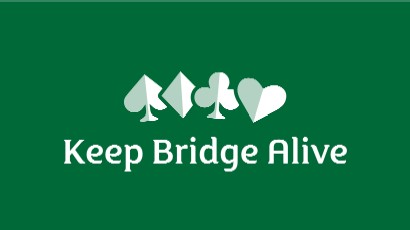You can be a bridge
teacher
You don't have to be a professional teacher or even an experienced player to promote
bridge and
recruit new players. Almost anyone can succeed as a bridge teacher. All you need
is an interested learner, a bit of patience and some help from the wealth of resources on the Internet.
Whether you're teaching a
group class or just one friend or family member,
these tips and web sites will make it easy to share your love of
the world's greatest game. |
 Keep
Bridge Alive is an international campaign to raise awareness of the
benefits of bridge and increase participation. Keep
Bridge Alive is an international campaign to raise awareness of the
benefits of bridge and increase participation.
Led by Samantha Punch of
the University of Stirling in Scotland, the project includes research,
publicity and other efforts to enhance the future of our game.
You can
help by reaching out to potential players and offering to share your
knowledge. Even if you've never taught bridge before, consider giving it
a try. |
♥ Provide
motivation. Emphasize the benefits of learning and playing bridge. These web pages
provide some good talking points:
Boost your brain power
Why play bridge?
♥
Get them
playing immediately. Bring out the cards
early, before you teach bidding rules. Try playing this simplified form of bridge that
doesn't require any bidding:
Minibridge is an easy introduction to cardplay and the concepts of
tricks, trump suits, honor points and contracts. More tips for teaching Minibridge are here:
https://www.ebu.co.uk/minibridge/11-easy-steps .
♥
Start here to teach basic bidding and play.
These free software programs from ACBL are highly
recommended as a first step for all learners.
Learn to
Play Bridge I & II -- Designed for those who have never played bridge, these
interactive programs offer a great introduction to the basics.
Users can progress through the lessons at their own pace and replay all the
example hands as many times as they like. These are the downloadable versions,
which can be played without an Internet connection. An online version is also available on the ACBL site.
♥
Take advantage of these web sites for learners.
You'll find help here with planning lessons,
setting up instructional hands and
printing handouts.
Direct your students to these sites to do reading that will supplement your
instruction. Take it slow, focus on the logic behind basic bidding principles
and be ready to repeat/review the basics as often as necessary.
How to play
bridge -- An overview of the purpose of the game and the basics of
bidding and play.
Beginner lesson from Richard
Pavlicek --
A concise introduction for the complete beginner. It includes a link to the full
text of the author's Bridge Basics textbook.
Karen's Bridge Library -- Bidding
summaries, quizzes, reference material and "how-to" tips for beginners and beyond.
Fifth Chair Bridge School
-- Sixteen introductory-level lessons and quizzes on basic bidding.
♥
Highlight
practice opportunities: Encourage your students to practice on
their own to develop their skills. It's easy and fun with online playing sites.
Solitaire Minibridge
-- The web page deals the hands. You see both your hand and partner's to
choose the trump suit and expected number of tricks, then play out the hand.
Bridgebase
solitaire games -- Seven different ways to play and practice, all free.
The best ones for beginners are:
♣
Just Play
Bridge -- An endless stream of hands where you bid and play against computer robots.
Robots play a basic 2-over-1 system.
♣
Just Declare
-- No bidding. The contract on each deal is pre-determined and you play the
hand against robots.
♣
Bridge
Master -- Similar to Just Declare, but with instructional deals to test
and improve declarer play. It offers five skill levels, from beginner
to world-class.
Bridgeclues
-- Instructional and entertaining quizzes from world champion Mike Lawrence. New
quiz hands on bidding and play are posted every day, grouped into three skill categories.
Developing your "card sense" -- Suggestions for skill-building activities
that don't require a computer.
♥
Help
your students take the next step. Introduce your students to
duplicate play -- online and at your local club. Ask your club manager if you
can play as a mentor with a newcomer in the club's novice games.
Discover the Fun & Challenge of
Duplicate Bridge -- This online booklet offers an overview of game movements, scoring, convention cards and
duplicate customs, plus tips for pair and team
play.
Bridgebase Online -- The biggest
online playing site, with free games in a variety of formats. The "Relaxed Club"
offers tables for newcomers.
♥
If you're teaching children or teens:
ACBL School Bridge
Program -- Instructions, tips and lesson plans for teaching youth and setting up group lessons at
schools. It includes the complete 116-page
teacher manual with lesson outlines, practice hands and worksheets. Use the email link to request a free school bridge packet.
Bridge Teachers for Youth --
Lesson plans, handouts, promotional materials and the complete text of the
"Bridge: A Path to Math" curriculum.
♥
Need more ideas? These sites offer
many helpful resources for bridge teachers.
American Bridge Teachers Association
ACBL bridge teachers page --
Teachers' newsletter, handbooks, online teaching tips and lesson plans for
several different courses.
ACBL teaching materials
-- Complete course outlines, teacher manuals and printable handouts.
Larry Cohen's
Learning Center -- Hundreds of articles. quizzes and practice hands on a
wide range of topics.
Northern Colorado and
Richmond VA bridge clubs --
Topics, outlines and handouts for mini-lessons.
 Keep
Bridge Alive is an international campaign to raise awareness of the
benefits of bridge and increase participation.
Keep
Bridge Alive is an international campaign to raise awareness of the
benefits of bridge and increase participation.